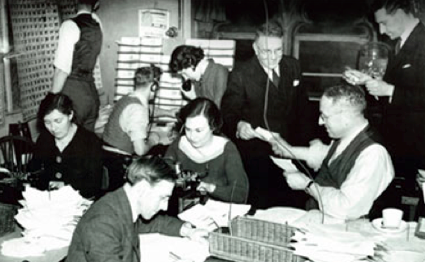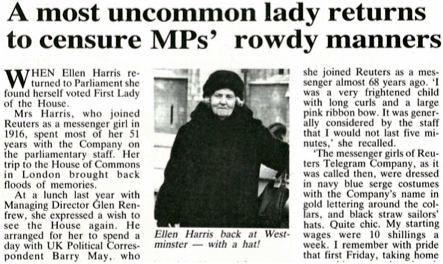Archives
A pioneer for women who broke through barriers
 On the night of Thursday 10 December 1936, a Reuters tele-typist dropped a two-word “rush” down the chute leading to the editorial floor below her office in London. The result was a few seconds of stunned silence, and then pandemonium. The words were “King abdicates” and the tele-typist - or copytaker - was Ellen Harris, always known within Reuters by her maiden name of Miss Baylis or “Bay”.
On the night of Thursday 10 December 1936, a Reuters tele-typist dropped a two-word “rush” down the chute leading to the editorial floor below her office in London. The result was a few seconds of stunned silence, and then pandemonium. The words were “King abdicates” and the tele-typist - or copytaker - was Ellen Harris, always known within Reuters by her maiden name of Miss Baylis or “Bay”.
Renowned as the fastest tele-typist in Fleet Street, she was well-qualified to deal with the torrent of words which followed.
She had joined Reuters as a 14-year-old messenger girl in the summer of 1916, one of the darkest moments of the early 20th century. The Great War was at its height and the Battle of the Somme was raging in northern France.
“I was a very frightened child with long curls and a large pink ribbon bow. It was generally considered by the staff that I would not last five minutes,” she recalled many years later.
In fact, she lasted five decades, working with many correspondents including Ian Fleming long before he wrote the James Bond novels.
I was told never to intrude upon any group of men even if one of the group should be a Reuter colleague
She was appointed to the parliamentary staff in 1927. In 1941, she had progressed through various secretarial posts and the world was again at war. Many male employees of Reuters had been called up for war service. As a consequence, she was asked to become a parliamentary shorthand reporter working as a typist and general editorial assistant at the House of Commons. Thus she became the first woman to be given a ticket for the parliamentary press gallery. So far as most of her male colleagues were concerned, a barrier had reluctantly been breached.
An introductory letter from Valentine Harvey, chief of Reuters’ parliamentary staff, summed up a widely-held feeling:
Under the scattered conditions in which the Gallery lives nowadays I do not think this will cause anybody any inconvenience although I have tried to avoid it for as long as possible. She is a very quiet and unassuming person well used to men. She is married.
The immediate point is whether there is any special cloakroom for women members of the Gallery. Is the Ladies Gallery one still in use? If not, where?
“I was told never to intrude upon any group of men even if one of the group should be a Reuter colleague”, she later recalled.
Having obtained her ticket for the parliamentary press gallery, Bay was certainly not going to relinquish it without a fight. She remained a ticket-holding member for 21 years. She was present in the Commons on the day in 1945 when Winston Churchill gave the momentous news that the war in Europe was over.
She even spearheaded another revolution in British parliamentary procedure by walking hatless into the House of Lords. As she said many years later in a recorded interview: “I had been sent to watch a certain point in the Lords and when I arrived without a hat I was told to go back and get one. This raised the question of difficulties over clothing coupons and shortage of clothes and the rules were altered to allow women to appear [in the House of Lords] without hats.”
The press gallery was not the only male bastion to be changed forever by Bay.
On her marriage in 1932 to Tom Harris of the editorial traffic desk she managed to persuade Reuters to relax its rule and allow her to remain in employment as a married woman. Permission was given but with the proviso that she would agree to retain her maiden name in the office. This blurred the fact that she was actually married. But she simply cancelled out the proviso by continuing to be known not as Miss Baylis but as Bay.
Bay retired from Reuters in 1967 after more than 50 years' service. In 1984, at 81, she returned to parliament with Barry May, UK political correspondent. She found little changed in the Reuters room there save for the absence of clattering machinery long replaced by video editing terminals.
 She noticed a great increase in the number of women reporters. “I wondered if they had been advised, as I was, never to wear bright clothing that might attract attention”.Ellen “Bay” Harris died on 10 April 1997, ten days before her 95th birthday.
She noticed a great increase in the number of women reporters. “I wondered if they had been advised, as I was, never to wear bright clothing that might attract attention”.Ellen “Bay” Harris died on 10 April 1997, ten days before her 95th birthday.
PHOTO: Reuters staff covering the 1935 British general election. Ellen “Bay” Harris - Miss Baylis - is seated on the left. Valentine Harvey, in shirt sleeves, is seated on the right taking copy from journalist George Anderson.
Right: Reuters World April 1984. ■
- « Previous
- Next »
- 34 of 49